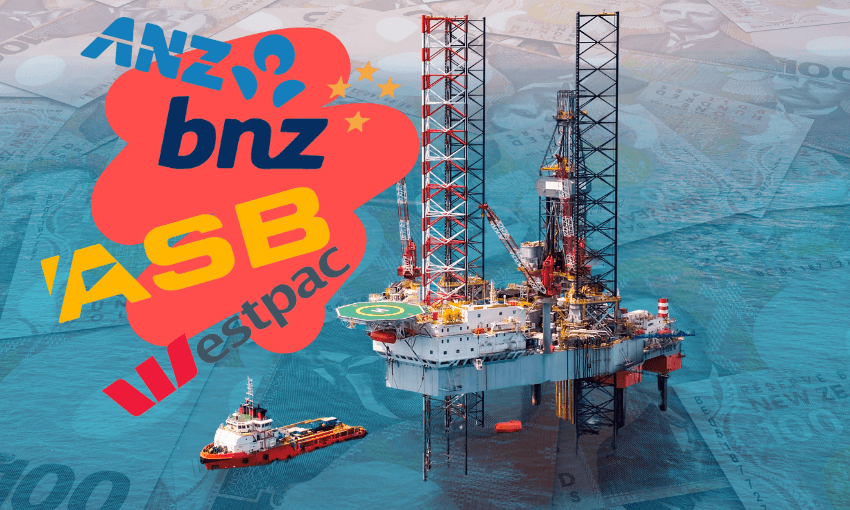A new report from Australian charity Action Aid reveals how the New Zealand banks’ Australian owners manage to sign up to international climate goals while continuing to fund fossil fuel companies.
Most people in New Zealand bank with four large banks, all of which are owned by overseas companies. BNZ’s parent company is the National Australia Bank, ANZ is wholly owned by ANZ in Australia, ASB is owned by the Commonwealth Bank and Westpac is a subsidiary of Westpac in Australia.
All four banks are members of the UN-convened Net Zero Banking Alliance (NZBA). A voluntary organisation, NZBA requires banks to publish emissions targets and transition their lending and investment portfolios “to align with pathways to net-zero by 2050 or sooner”, according to their commitment statement, signed by bank CEOs.
Simultaneously, in the near decade since the Paris Agreement was signed, Australia’s big banks have lent more than AU$61 billion to fossil fuel companies, according to research from Australian charity Action Aid, which particularly focuses on how ongoing climate-caused disaster hurts low-income women, who are 14 times more likely to die in a climate disaster than men.
Two fossil fuel companies that have received big chunks of money from Australian banks are Woodside and Santos, whose emissions in a year are more than most Pacific companies combined. These two companies alone have received more than $5 billion in climate financing since 2016 when banks joined the NZBA.
How do banks square climate commitments and ongoing fossil fuel funding? One way is to take advantage of NZBA’s requirement that loans have to be made to companies with plans to transition away from fossil fuels. However, “there are well-founded concerns… that member banks will instead continue to finance fossil fuel projects through insufficient target and policy setting,” the Action Aid report says.
In other words, banks can lend money to companies with transition plans, even if they’re not realistic. “There’s a lot of language like ‘we will engage with clients, we’ll work towards net-zero,” says Katherine Tu, Action Aid’s head of policy and campaigns, who helped write the report. “That’s not strong enough – banks need to say ‘we will decline’ clients without realistic climate plans.”
Another complicated aspect of managing climate funding is that banks can put money into different categories. Companies can get loans directly for a project, or as “corporate financing”, which just means money that can be used for the company’s general activities. Since the banks became members of the Net Zero Banking Alliance, there has been much less direct project financing for fossil fuel companies, but continued corporate loans. The banks have also issued more bonds, which operate like an IOU, with the banks accepting the risk of bringing a product to market rather than providing money directly.
“Banks might say they’re not directly funding oil and gas giants, but they find these loopholes to continue to fund more fossil fuels,” says Tu. Though Action Aid’s research concerns Australian banks, and the New Zealand subsidiaries may have different policies, profits from your home loan still benefit the Australian banks. Smaller New Zealand banks like Kiwibank and The Cooperative have no fossil fuel loans or associated emissions.
What would happen if fossil fuel companies could no longer get loans from banks? The furore around “debanking” cryptocurrency ventures – closing accounts or not allowing accounts to be opened – gives a glimpse of what is possible. Many banks see cryptocurrency as too risky (or scam-ridden) to guarantee. This allegedly makes it much harder for new ventures to start up, although it’s difficult to tell how common cryptocurrency debanking really is. What would happen if banks considered fossil fuels as risky as cryptocurrency or as stigmatised as sex work?
“Not being able to access money can certainly result in delays,” says Tu. “[Australian mining company] Santos has a gas project called Barossa off the coast of Darwin which has been delayed because of the environmental rights and human rights issues.” As a result, developing the project has become much more expensive. Fossil fuel producers and contractors have also told the Australian government that financial decisions made by investors and insurers wanting to reduce their exposure to fossil fuels have made it much harder for them to get funding or underwriting for projects.
Pressuring banks to cease investment in fossil fuels is part of the divestment movement, an effort to get institutions like universities to stop profiting from investments in fossil fuels. Spearheaded by the group 350.org, the campaign has seen organisations with more than $40 trillion (USD) in assets committing to no longer financing fossil fuels. While it’s been argued that divesting will just mean less-transparent nationalised oil companies can make more profits, public pressure has clearly had an impact – and has in many cases led to financial gain for the organisations divesting.
The ease with which you can navigate a banking app to open a new term deposit or apply for a credit card might seem a world away from homes destroyed by wildfires or the stress of food shortages caused by rising temperatures. Yet through the financial system, all is connected. “By continuing to fund fossil fuels, banks fund the climate crisis – this affects us all,” says Tu.



